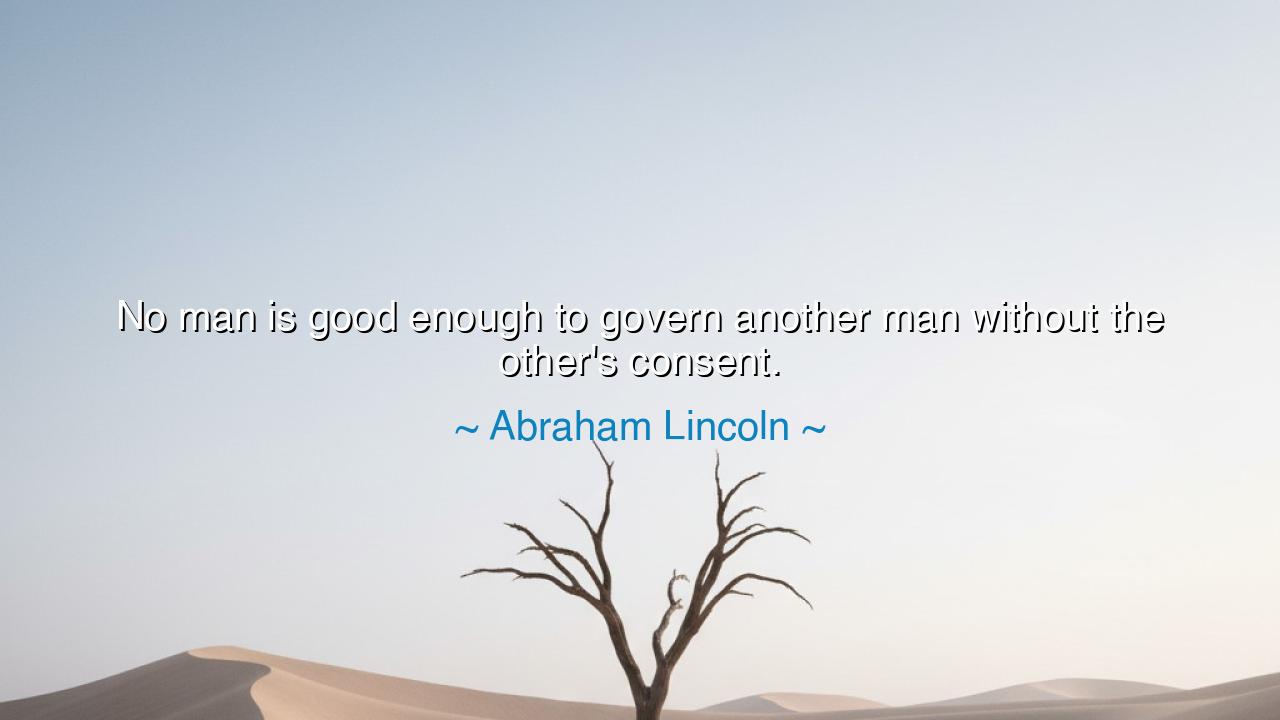
No man is good enough to govern another man without the other's






"No man is good enough to govern another man without the other's consent." — Abraham Lincoln
Hear these words, O sons and daughters of liberty, and feel their solemn fire. Abraham Lincoln, the great emancipator, spoke them as both a declaration of truth and a rebuke to tyranny. When he said, “No man is good enough to govern another man without the other’s consent,” he gave voice to one of the most sacred principles of civilization — that freedom is not a gift granted by rulers, but a right inherent in every human soul. These words were not spoken in comfort or ease, but in the shadow of division and slavery, when the question of whether one man could own another darkened the conscience of a nation.
The meaning of this quote shines like a beacon through the centuries: authority without consent is tyranny. Lincoln reminds us that moral greatness does not grant a man the right to command others; that wisdom, power, or virtue can never justify domination. True governance must arise from the consent of the governed, for only in that consent does power gain legitimacy. Every man, however humble, is a sovereign of his own soul — and to rule him without his will is to violate the natural order established by the Creator Himself. Thus Lincoln’s words are not merely political — they are spiritual. They affirm that liberty is woven into the essence of humanity, and that no hand, however benevolent, may bind it without sin.
The origin of this truth can be found in Lincoln’s lifelong opposition to slavery. He spoke these words in 1858, during the famous debates with Stephen Douglas, as he defended the moral foundation of democracy. Douglas had argued that each state should choose for itself whether to allow slavery — that the majority had the right to decide the fate of the few. But Lincoln saw deeper. He understood that no majority, no government, no man has the moral authority to take away what was never his to give — another’s freedom. To govern without consent, he said, is to turn men into property, to make mockery of justice, and to strike at the heart of the Declaration that “all men are created equal.”
Consider, my friends, the great contradiction of Lincoln’s age: a nation founded upon liberty yet sustained by bondage. Millions were held in chains, governed not by their own will, but by the will of masters who claimed divine sanction for their cruelty. Lincoln’s words tore through this illusion. He exposed the lie that a man could be both good and a tyrant, both righteous and a ruler over unwilling hearts. In his conviction, we hear the echo of all those who have resisted oppression — from the Israelites fleeing Pharaoh to the patriots who cast off the yoke of kings. His truth is eternal: there is no justice in authority that denies consent, no peace in power that silences freedom.
History, too, confirms the wisdom of Lincoln’s creed. Every empire that has sought to rule without the consent of its people has fallen beneath the weight of its own arrogance. The British crown lost America not through weakness, but through pride — for it taxed and ruled a people who demanded a voice in their destiny. The kings of France lost their thrones because they governed not as servants, but as masters. Even in modern times, revolutions have risen where governments have forgotten this sacred law. The consent of the governed is not a courtesy — it is the cornerstone upon which all lasting order must stand.
Yet, Lincoln’s words reach beyond governments — they touch the very fabric of human relationship. For in every bond between man and man, woman and woman, leader and follower, teacher and pupil, there lies this same truth: that respect cannot be imposed, and loyalty cannot be compelled. A parent may guide, a mentor may counsel, but the heart must yield freely. To demand obedience without understanding is to create resentment, not harmony. True authority is born not from force, but from trust. When consent is given, leadership becomes noble; when it is taken, it becomes tyranny in any form — whether in homes, nations, or hearts.
So let this be your lesson, O inheritors of liberty: never govern without consent, and never surrender your consent without reason. Freedom is not merely the right to act, but the duty to choose rightly. Govern yourself first — your impulses, your pride, your desires — and you will understand the weight of governing others. When you lead, seek the agreement of those you guide, for no wisdom can justify domination. When you follow, do so with open eyes and willing spirit, not from fear, but from conviction. For Lincoln’s words are not only a defense of democracy — they are a hymn to dignity itself. And if ever you doubt their power, remember the world he shaped by them: a world where millions were freed, where justice was reborn, and where the voice of the oppressed rose to say, at last, “I am my own master.”






AAdministratorAdministrator
Welcome, honored guests. Please leave a comment, we will respond soon